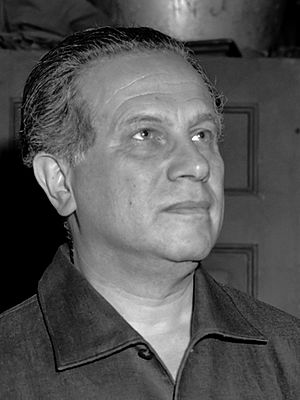Antal Doráti facts for kids
Antal Doráti KBE (born April 9, 1906 – died November 13, 1988) was a talented Hungarian-born conductor and composer. He later became an American citizen in 1943. Doráti was famous for leading many orchestras and making a huge number of recordings during his life.
About Antal Doráti
Antal Doráti was born in Budapest, Hungary. His family was very musical. His father, Alexander Doráti, played the violin in the Budapest Philharmonic Orchestra. His mother, Margit Kunwald, was a piano teacher.
Antal studied music at the famous Franz Liszt Academy. He learned composition from great teachers like Zoltán Kodály and Leó Weiner. He also studied piano with the well-known composer Béla Bartók. Doráti worked with Bartók for many years. He even conducted the very first performance of Bartók's Viola Concerto in 1949.
He started his conducting career in 1924 at the Budapest Royal Opera.
Besides writing his own music, Doráti also arranged music by other composers for ballets. For example, he put together pieces by Johann Strauss II for the ballet Graduation Ball (1940). He also created music for Bluebeard (1941) using music by Jacques Offenbach. Another ballet he worked on was The Fair at Sorochinsk (1943), using music by Modest Mussorgsky.
In 1979, he published his autobiography, which is a book about his own life, called Notes of Seven Decades.
In 1983, Doráti was given a special honor. He was made an honorary Knight Commander of the Order of the British Empire (KBE) by the British government. This is a very high award.
Antal Doráti was married to Ilse von Alpenheim, who was an Austrian pianist. He passed away in Switzerland at the age of 82.
Doráti's Conducting Career
Antal Doráti led many important orchestras around the world. Here are some of the main groups he worked with:
- Ballet Russe, Music Director (1937–1941)
- Ballet Theatre orchestra (1941–1945)
- Dallas Symphony Orchestra (1945–1948)
- Minneapolis Symphony Orchestra (1949–1960)
- BBC Symphony Orchestra (1963–1966)
- Stockholm Philharmonic Orchestra (1966–1974)
- National Symphony Orchestra in Washington, D.C. (1970–1977). He helped this orchestra a lot, even saving it from financial trouble.
- Detroit Symphony Orchestra (1977–1981)
- Royal Philharmonic Orchestra (1975–1979)
Famous Recordings
Doráti made his first recording with the London Philharmonic Orchestra. Throughout his career, he made more than 600 recordings!
He was the second conductor to record all of Joseph Haydn's symphonies. He also recorded all of Haydn's operas.
Doráti became very famous for his recordings of Tchaikovsky's music. He was the first conductor to record all three of Tchaikovsky's famous ballets completely: Swan Lake, The Sleeping Beauty, and The Nutcracker. These recordings were made in the 1950s with the Minneapolis Symphony Orchestra.
He also made a very special recording of Tchaikovsky's "1812" Overture. This recording was unique because it used real cannons, a brass band, and church bells! It was one of the first recordings to do this. Both the mono and stereo versions of this recording sold over one million copies. He also recorded all six of Tchaikovsky's symphonies.
Other important composers in Doráti's recording career were Béla Bartók and Igor Stravinsky. He recorded many of Bartók's orchestral works.
He also made the first stereo recording of Léo Delibes' Coppélia. Another popular recording was of Wagner's Der fliegende Holländer.
In 1969, he made the first recording of Sibelius's tone poem Luonnotar. In 1973, he conducted the first recording of Max Bruch's Concerto for Two Pianos and Orchestra, which was a piece that had been lost and then found again.
He also made digital recordings with orchestras like the Detroit Symphony Orchestra and the Royal Philharmonic Orchestra. One of his digital recordings, Stravinsky's The Rite of Spring, won a prestigious French award called the Grand Prix du Disque.
See also
 In Spanish: Antal Doráti para niños
In Spanish: Antal Doráti para niños
- Haydn: La fedeltà premiata (Antal Doráti recording)
- Haydn: Il mondo della luna (Antal Doráti recording)
 | Roy Wilkins |
 | John Lewis |
 | Linda Carol Brown |


